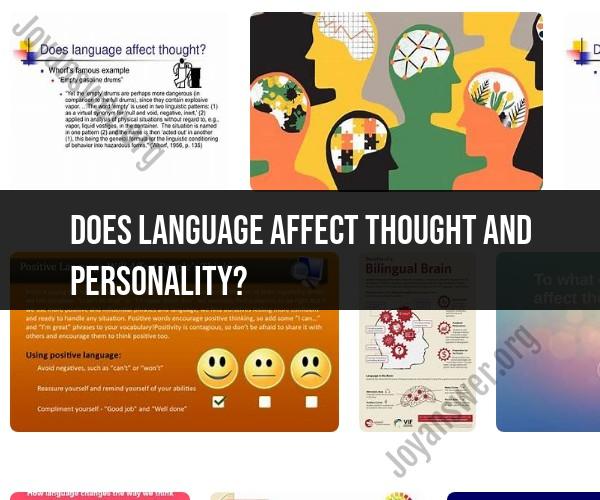Does language affect thought and personality?
Yes, language can have a significant influence on thought and personality. This relationship between language, thought, and personality is a complex and debated topic in psychology and linguistics, but there is evidence to suggest that language can shape and influence both.
Here are some key ways in which language can impact thought and personality:
Language Shapes Thought: Different languages have different structures, vocabularies, and ways of expressing ideas. The words and concepts available in a language can influence how individuals perceive and think about the world. For example, some languages have words for concepts that don't exist in other languages, which can affect how people from those cultures think about those concepts.
Linguistic Relativism: This is the idea that the language you speak can influence the way you think. The Sapir-Whorf hypothesis suggests that language can shape thought by influencing what concepts and ideas individuals are capable of understanding and expressing.
Cultural Influence: Language is closely tied to culture, and culture plays a significant role in shaping personality. Different languages may reflect and reinforce cultural norms and values, which can, in turn, influence an individual's personality traits and behaviors.
Communication and Socialization: Language is the primary means of communication, and it plays a crucial role in social interactions. The way individuals use language and their ability to express themselves can impact their social relationships, which, in turn, can affect their personality development.
Self-Concept and Identity: The language we use to describe ourselves and others can shape our self-concept and identity. The words and labels we use to describe our attributes and characteristics can influence how we perceive ourselves and how we interact with the world.
Bilingualism: People who are bilingual or multilingual often report that they have different personalities or perspectives when using different languages. This phenomenon is known as the "linguistic relativity" effect, where the language used can influence one's behavior and thought patterns.
It's important to note that while language can influence thought and personality, it doesn't completely determine them. Individuals have agency and the ability to adapt and change their thoughts and behaviors, and they can express their personalities in various ways through language. Additionally, other factors such as genetics, upbringing, and personal experiences also play a significant role in shaping an individual's personality and thought processes.
Language's Impact on Thought and Personality: An Exploration
Language is a powerful tool that shapes our thoughts and personalities. It helps us to make sense of the world around us, to communicate with others, and to express ourselves. But language does more than just convey information. It also influences the way we think and feel.
One way that language influences our thoughts is by shaping our perceptions. The words we use to describe the world can affect how we see it. For example, if we are constantly bombarded with negative news stories, we are more likely to develop a negative view of the world.
Language also influences our thoughts by shaping our categories. We use categories to organize our thoughts and experiences. The categories we use can affect how we think about things. For example, if we categorize people into different groups, we may start to see those groups as different and separate.
Language also influences our personalities. The words we use to describe ourselves and our experiences can shape our self-concept. For example, if we constantly tell ourselves that we are stupid, we are more likely to believe that we are stupid.
The Language-Personality Connection: Unraveling the Effects
The connection between language and personality is complex and multifaceted. On the one hand, language can be used to express our personality. We can use words to convey our thoughts, feelings, and values. For example, if we are outgoing and friendly, we may use words like "happy" and "excited" to describe ourselves.
On the other hand, language can also influence our personality. The words we use to describe ourselves and our experiences can shape our self-concept. For example, if we constantly tell ourselves that we are introverted, we may start to believe that we are introverted.
Research has shown that bilingual people tend to have different personalities in different languages. This is likely due to the fact that different languages have different cultural norms and values. For example, a person who is shy in English may be more outgoing in Spanish, if they speak both languages fluently.
How Language Shapes Who We Are: A Dive into Thought and Personality
Language is a fundamental part of our identity. It helps us to make sense of ourselves and the world around us. It also helps us to connect with others.
Language shapes our thoughts and personalities in a number of ways. It influences our perceptions, categories, and self-concept. It also influences how we express ourselves and interact with others.
Here are a few examples of how language can shape our thoughts and personalities:
- A child who is constantly told that they are smart is more likely to believe that they are smart. This can lead to a higher sense of self-confidence and a greater willingness to take risks.
- A person who is constantly exposed to negative news stories is more likely to develop a negative view of the world. This can lead to feelings of anxiety and depression.
- A bilingual person who is more fluent in one language than the other may feel more comfortable expressing themselves in that language. This can lead to different personalities in different languages.
Language is a powerful tool that can be used to shape our thoughts and personalities. It is important to be aware of the ways in which language can influence us, so that we can use it to our advantage.













